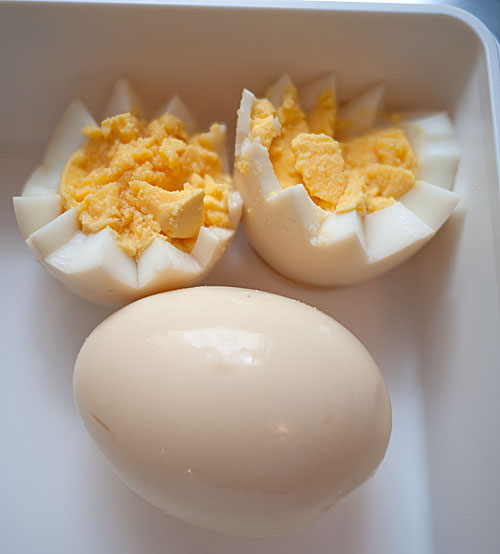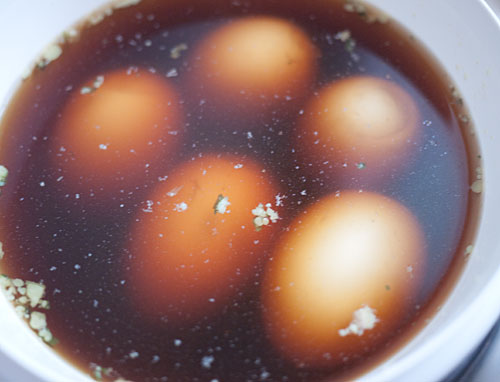Really frugal ramen soup eggs

Eggs are great for bentos, and I have quite a few egg recipes here. Hard boiled eggs on their own require some kind of seasoning, even if they look too cute to eat, so so far I've shown you how to make them tasty on their own, by turning them into tea eggs the lazy way, marinating them in miso, or the quickest of them all, my mother's soy sauce eggs. Now, the recipe I'm showing you today is so frugal and low-brow that I am almost ashamed to put it up here. But hey, it's good! And, so easy that even a college student with no cooking skills could make it. Of course, s/he would need to know how to boil an egg, but other than that...
If you've been go a good ramen place, you've probably encountered those richly flavored soft boiled eggs that are often on top of your bowl of noodles. Those eggs are so delicious because they have been simmered in the delicious soup. Soft boiled eggs may not be the safest thing to bring in a bento (unless you're sure you have good, fresh eggs to start with*) but why not try to bring that ramen-soup flavor to your hard boiled eggs?
The best way to do that is to have real ramen soup. But even that powdered soup that comes in a packet of instant ramen will do. Sure it's loaded with salt and MSG and all those good things...but only a bit of that will penetrate the eggs anyway. And you could make the argument that by not drinking that soup up, you are saving yourself some calories and stuff (since the soup usually has quite a lot of oil in it too).
Barely a recipe at all: Instant ramen soup eggs
- Eggs
- Instant ramen soup packets
Boil some eggs to the soft boiled stage - 4 minutes will do. They should be firm enough to peel intact, but still soft in the middle, or they'll get overcooked later. Drain the eggs and run cold water over them until they've cooled down. Peel the eggs.
Heat up some water for the soup. The soup should be fairly intense, so allow 1 cup for every packet of instant ramen soup. When the water is boiling, add the soup and the peeled eggs, and turn off the heat. Put a lid on and leave for 5 minutes, then open the lid and leave to cool down. Once cool, transfer to a container with tight fitting lid, and leave to marinate in the refrigerator. Here I used your basic Sapporo Ichiban Shoyu (soy sauce) Ramen's soup.

You can start eating them as soon as the eggs have cooled down, though they're better after a night. Eat up within a week. (No, hard boiled eggs cannot be frozen - they turn horribly rubbery.)
Depending on the color of your soup, the eggs will take on a deeper or lighter shade of beige. Soy sauce based soup will be the darkest, followed by miso based soup. Salt based soup (shio-ramen soup) will be the lightest in color, but still flavorful.
The better the quality of your soup, the better the eggs will taste! If you can get a hold of the 'gourmet' quality ramen packs that are popular in Japan now, try this with the soup packets from those. I tried once with some Sumire Ramen I brought back from the Shin Yokohama Ramen Museum, which was quite amazingly good!
You can add a bit of the soup to the yolk when you've cut the eggs open and packed it in your box, for added flavor.
Now...what to do with the ramen noodles you have left over? Boil them as usual and use for stir fried noodles. Or try them hot with melted butter and a bit of soy sauce...so bad for you, and really good.
Or.....if you want to be really frugal, you can still have your ramen in soup and soup for your eggs. When you make your ramen, just pour off some of the soup, and use that to marinate a boiled egg or two. If you forget to reserve soup and you don't mind the eww factor involved, you can use the soup left over in your bowl after you've finished eating the noodles. This kind of thing so reminds me of my penniless college/just-started-working days. ^_^;
Egg safety
*You'll often see soft-boiled eggs and soft-set yolk fried eggs on Japanese bento blogs. Japanese eggs are generally sold so that they're safe to eat raw, since that's what a lot of people do (raw eggs on rice for breakfast, raw eggs as a dipping sauce for sukiyaki, etc.) However, if you live in a country where the egg producers tell you you must cook your eggs until they are the texture of washing up sponges (I'm looking at you, American Egg Board) then you need to take care that your eggs, especially for bentos, are cooked through. Or, find a good producer locally where you can purchase safe, fresh, eggs - they'll be more expensive than the battery produced kind, but so much better in so many ways.
If you enjoyed this article, please consider supporting this site by becoming my patron via Patreon.
